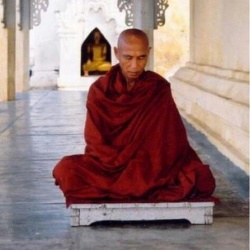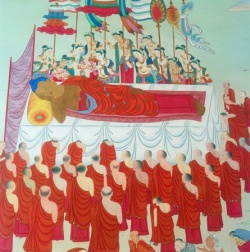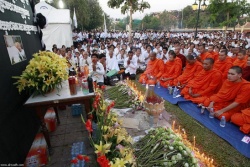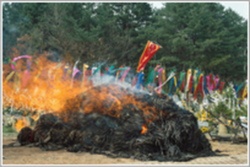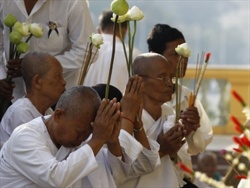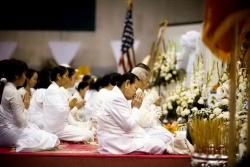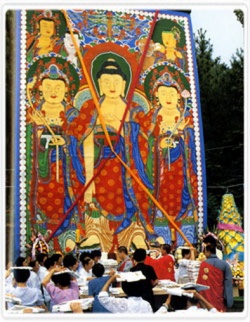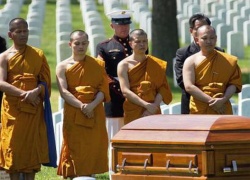Buddhist Belief In Funerals
In most cultured and civilized societies, a funeral is considered as a sad and solemn occasion. A Buddhist funeral should accordingly be a solemn occasion and should be conducted as such.
This is a widespread superstition among some people that it is “bad luck” to bring a corpse into a home if a person has died elsewhere. We are bound to show our respect for the memory of the dead person to treat the body with proper respect by giving it a decent funeral. Whether the body is brought home or not depends on what is most convenient for the bereaved members of the family. In this connection, we should also mention that there should be no fears or taboos regarding the handling of a dead person. Some people are afraid to touch a corpse thinking they will be faced with “bad luck.” If this were true, doctors and nurses should be the most miserable people on earth! If we truly wish to honor the memory of our departed ones, we should bathe and dress the body and not leave it to some stranger from an undertaker’s firm to do it for us. Remember that superstition, ignorance, and irrational fear brings more “bad luck” than gratitude, love, and good taste.
Contrary to popular belief, the noisy, elaborate and sometimes showy or grand funeral processions costing thousands of dollars on unnecessary things and which are often regarded as normal ‘Buddhist practices,’ are in fact not Buddhist practices at all. It is a total misconception to associate all these practices with Buddhism. They are just the perpetuation of age-old customs and traditions handed down from past generations, which are being adhered to blindly. When viewing such funeral rites people of other faiths often wonder whether what they are watching is a procession celebrating some happy festival or a solemn funeral.
Quiet often a loud music instead of a solemn music is performed during a funeral procession. One would therefore gain the impression that the ceremony is designed more to make an outward show of affluence rather than to express genuine sorrow and respect for the deceased. Although Buddhism does not object to perpetuating cultural practices, so long as they are not in conflict with the teachings of the Buddha, it is felt that wasteful, uneconomical, and unnecessary practices, which are not beneficial either to the departed, or the living should be discouraged or discarded altogether. For example, the traditional practice of burning paper money, joss-paper and symbolic paper houses, designed purportedly for the benefit of a deceased person for use in the life hereafter, is definitely unBuddhistic. However, if it helps one psychologically to minimize one’s sorrow by making him think he is doing something beneficial for the departed, it is harmless, but nonetheless one should not go to extremes or believe it can help the deceased in any way.
Buddhism does not object to different communities performing different funeral rites, which are suitable for each locality and time. But the most important thing is that they must be culturally acceptable and practical.
The rites attached to a Buddhist funeral should be simple, solemn, dignified, and meaningful. In many countries, Buddhist monks are invited to the house of the deceased to perform religious rites prior to a funeral. The offering of flowers and the burning of a few joss sticks and candles are normally accepted religious practices on such an occasion.
It is customary as a mark of respect, for friends and relatives to send wreaths of flowers for the funeral. These should preferably be ordered so as to arrive at the house not earlier than the afternoon before the funeral, otherwise on the sad day itself they many be faded. However if the obituary notice specifically states “no flowers,” then this request should be strictly respected.
Because relatives have different opinions on funeral rites, there are many arguments about the proper rituals to be performed. People have often asked the following questions:
1. Should there be a burial or cremation?
2. If cremation, what does one do with the ashes?
3. What kind of coffin must we use?
4. Must we wear black or white mourning clothes?
5. What color of candles must be used, red, or white?
6. How many days must the body be kept before burial or cremation?
7. What is the limit of expenditure for a funeral?
All these questions can simply be answered in this way:
The funeral must be simple, with the least amount of fuss, but with dignity. Perhaps the most sensible thing to do would be for the immediate members of the family and close friends to have an informal discussion on the best way to conduct the funeral service in conformity with prevailing practice, with quiet dignity and without incurring unnecessary expense. If they are unable to attend to these themselves, then it is advisable that this be left to a reputable undertaker as he would understand all that is to be done and thus will take much trouble and responsibility off the relatives’ hands. Advice may be also sought from a respectable monk who can really guide the family as to what would be the best way to conduct a funeral in a befitting manner that would be in accordance with the Buddhist way of life. It has to be remembered that as far as Buddhist rites are concerned there are no hard and fast rules to be strictly observed. In this as in all matters, we must always try to follow the Buddha’s advice to maintain moderation and respectability in whatever we do, without causing harm to others. If we can use the occasion to contemplate with gratitude the good work done by the deceased during his life time, to remember that we ourselves will have to depart some day and that we should do whatever good we can for so long as we live, then our contribution would be meaningful and dignified.
What is the proper attire for a funeral? In Buddhism, we are advised to always dress decently and moderately. There is no hard and fast rule as to what we should wear at a funeral, but good taste dictates that we should dress somberly and discard ornaments in deference to the feelings of the bereaved family and out of respect for the memory of the deceased. A woman in mourning may perhaps wear her wedding or engagement ring. It is better to wear clothes in which are in black, white, gray or some such related color but the matter is entirely left to the individual and his sense of propriety even thought ‘black’ is normally recognized as the accepted symbol for mourning.
How long should a body be kept before burial or cremation? We who live in a hot and humid climate should understand that decomposition takes place very fast and that it is unhygienic to keep a body for far too long. Besides, it would impose a great strain on the relatives of the deceased in having to bear with the proximity of the corpse for a period longer than in really necessary. Also, certain mourners out of sheer emotional grief tend to kiss the body and touch it excessively. This is understandable given the strong emotional feelings that people have to bear, but it should not be overdone or encouraged. While one cannot dictate exactly as to how long a body should be kept, it is wise not to unnecessarily prolong the rites. As a general rule, it seems most practical to allow a lapse of about a day or two for funeral arrangements to be made and for friends or relatives to be informed.
On the day of the funeral, the services of Buddhist monks would again be called on to perform the necessary religious service at the home and the cemetery. It has been the practice amongst certain people to offer roasted pigs and chickens as symbolic offerings for the deceased. Such a practice is not encouraged in Buddhism because it involves the killing of innocent animals. To offer sacrificial offerings to the departed ones is definitely against the teachings of the compassionate Buddha and should be discarded. Simple floral tributes together with the burning of incense and candles would suffice as symbolic offers.
Burial and Cremation
Many Buddhists have asked whether a deceased person should be buried or cremated. Buddhism, being a free religion, is flexible on this issue. There is no hard and fast rule, although in some Buddhist countries, cremation is the normal accepted practice. The choice of one method or another should be in accordance with the last wishing of the deceased or be left to the discretion of the next-of-kin.
In the modern concept however, cremation as a hygienic form of disposal of the body, should be encouraged. With the improvement in health standards and the so-called population explosion, usable land is becoming scarce and hence it is advisable to resort to cremation and allow the use of valuable land for the living instead of crowding it with innumerable tombstones.
Whether for burial or cremation, it has been observed that certain people for sentimental reasons would like to put valuable personal belongings of the deceased into the coffin in the hope and belief that the departed one would in some way benefit by it. It is a fallacy to expect that burial or burning of such belongings would have any merit at all. Instead of putting such things inside a coffin or a crematorium, it would be much more practical and sensible to donate the useful personal belongings, such as clothing, shoes, and many other things to the poor and the needy or to some charitable institution. Any help to the poor and needy is an act of merit, which benefits the living and the dead. The fear that some people have with regard to the use of belongings of a deceased person is meaningless and unsustainable.
Disposal of Ashes
The question has often been asked whether would be better to bury the ashes, enshrine them in a building or have them strewn into the sea. The Buddha did not leave any specific instructions on the matter because he wanted us to understand that the body is nothing more than a combination of physical materials, which will ultimately return to the same elements of Solidity, Fluidity, Heat, and Motion. Upon death only two elements will remain, namely Solidity and Fluidity which, when reduced to ashes, has no spiritual significance. Because we regard the remains as a reminder of the dead person whom we had once loved, we treat them with respect. But we must not get attached to them or even think that they in any way will have any link with the person who has since died. Buddhism teaches that the life force departs immediately after death, and that it takes one another life form elsewhere.
The practice of keeping the remains of the dead goes back to our earliest past. In those days when people believed in a permanent life force, it was the practice like in the case of the Egyptians to preserve the remains in the hope that the departed spirit would thereby maintain contact with the living. Great imposing tombs and monuments were built around them. But such practices were reserved only for important personages like kings and religious leaders. The rest of the population’s remains were simply disposed of in any suitable way.
In contrast to this there is another practice, namely that of ancestral worship whereby the living maintained contacts with the dead by observing ritualistic practices around the dead. This gave rise to the practice of preserving the ashes in urns or other receptacles to be revered, a practice which is still being carried on even to this day.
Some people wish to enshrine the remains in a building while others bury them. Another method is to throw the ashes into the sea or a river. This is basically a Hindu custom where the belief is that the remains will ultimately be re-united with the original creative force.
There is no harm in adopting any of these methods but they must not be considered as being specifically Buddhist or which Buddhists must follow. Also we should not get the wrong idea that by keeping the remains in a holy place like a temple the departed person will be “safe” from having to experience the effects of his karma. It is all right as a mark of respect in the memory of the dead, but nothing more. In Buddhism, the manner of disposing of the remains of the deceased is for the bereaved family to decide so long as good taste and decorum prevail.
This is based on “Buddhism For The Future, “by Dr. K. Sri Dhammananda.
